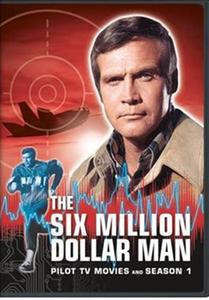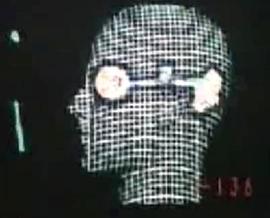 As the long holiday weekend begins and languorous summer nears, my brain is stuck on a troubling image. In the opening sequence for the 1970s ABC TV series The Six Million Dollar Man, former astronaut Steve Austin (Lee Majors) crashes his experimental jet and is subsequently--literally--reconstructed.
As the long holiday weekend begins and languorous summer nears, my brain is stuck on a troubling image. In the opening sequence for the 1970s ABC TV series The Six Million Dollar Man, former astronaut Steve Austin (Lee Majors) crashes his experimental jet and is subsequently--literally--reconstructed.
"Gentlemen, we can rebuild him," the voiceover intones. "We have the technology. We have the capability to make the world's first bionic man. Steve Austin will be that man. Better than he was before. Better... stronger... faster." Then we see him running at what is meant to be superspeed, though initially--and often later--he seems to be hyper-sprinting in slow motion.
Why am I thinking about this? Blame HuffPost, which clued me in recently to "a new hack for speed reading doing the rounds on Twitter right now. It's called 'bionic reading' and it's really dividing people."
Bionic Reading's website describes the strategy as "a new method facilitating the reading process by guiding the eyes through text with artificial fixation points. As a result, the reader is only focusing on the highlighted initial letters and lets the brain center complete the word. In a digital world dominated by shallow forms of reading, Bionic Reading aims to encourage a more in-depth reading and understanding of written content."
BR "revises texts so that the most concise parts of words are highlighted. This guides the eye over the text and the brain remembers previously learned words more quickly." Founder & owner Renato Casutt observes: "Future needs origin. I'm a typographic designer from Switzerland with 25 years of experience. Passionate about what I do and full of joy to be able to help other people. Growing with Bionic Reading and breaking old patterns has been driving me for years."
Answering the "why" question, BR "aims to play a supporting role in the absorption of volume text. We see technological progress as an opportunity for all those who want to increase the pleasure of reading in a noisy and hectic world in a focused way and without distraction."
HuffPost had some fun sharing Twitter overreactions (redundant, I know) to the concept, noting that while some people praised the idea, "others worried that speed reading in this way was 'robotic,' would take the joy out of reading, and might stop you from retaining any of the information. One even called it a 'sickening technoperversion.' Some Twitter users said it could help those with cognitive issues, such as dyslexia or ADHD, while others suggested it would do the opposite and make it more difficult, as they may likely already substitute a 'close enough' word, which could change the whole context of what was being read."
 Then, without warning, The Six Million Dollar Man made a cameo appearance in my brain. Specifically, I considered Steve Austin's bionic left eye, which (or so Wikipedia tells me) had a 20.2:1 zoom lens and night vision function, but no apparent gains in reading focus and comprehension. I'm still marveling at how he ran at high speed in slow motion.
Then, without warning, The Six Million Dollar Man made a cameo appearance in my brain. Specifically, I considered Steve Austin's bionic left eye, which (or so Wikipedia tells me) had a 20.2:1 zoom lens and night vision function, but no apparent gains in reading focus and comprehension. I'm still marveling at how he ran at high speed in slow motion.
I suspect I'm not the target audience for BR. Speed reading innovations have never appealed. Evelyn Wood Reading Dynamics long ago promised to teach me how to determine my current reading rate, then increase it immediately. "Your reading speed will double--guaranteed!... Polish off entire books in one sitting. Plus, there's an advanced comprehension and retention system that will help you understand more."
No thanks. I've always been rubbish at fast reading, not least because I have no interest in the concept beyond curiosity. I could be a poster child for the Slow Books movement. By nature and temperament, I'm a patient and deliberate reader, though the pace increased measurably when I took a bookseller's job in the early 1990s.

During my really slow reading years, I was habitually monogamous, spending a month with a book, three months with a writer's works. For a long time now, however, I have juggled several books at once--good books and bad books; print books, e-books and audiobooks--while ever casting a covetous gaze toward other tempting titles within reach on shelves and online. There have been far too many one-night-reads, when I scanned 50 pages and bailed.
But I can't really say I read dramatically faster than I used to. As a bookworker, I don't always have a vested interest in the titles that land on my desk, though I begin each with hope. Page one is always full of possibility.
Books remain irresistible. Can I read them all? No. But within the considerable limitations of my ability, time and attention span, I'm reading as fast as I can. Except, of course, when I read... slowly.
Reading is a journey, not a race. With that in mind, enjoy this long weekend, the first taste of summer before summer officially begins. And slow down if you're reading too fast. As Arden Reed observes in Slow Art: The Experience of Looking, Sacred Images to James Turrell, "slowness is also essential to grasping the experience of modernity--if only because the hallmark of modernity is speed."

